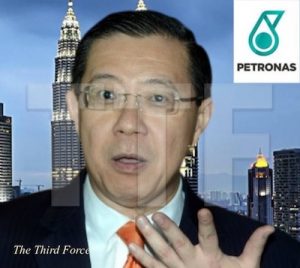
Following (in orange) is an excerpt of a speech delivered by Lim Kit Siang in Parliament on the 20th of May 2005:
Petronas owns 64.4 per cent of Putrajaya Holdings. The other two major shareholders are Khazanah Holdings and Kumpulan Wang Amanah Negara. The latter is an oil reserve fund set up in the late 1980s in the aftermath the then UMNO crisis between Team A and Team B. The fund is shrouded in secrecy since its inception. All three institutions are not private companies by any definitions.
They are GLCs, or Government-linked corporations. The term GLC has become fashionable recently, introduced to the Malaysian lexicon by the Prime Minister. While there have been a lot of discussions on the performance of various GLCs, not much has been said about Petronas or the national oil reserve fund corporation.
Petronas is probably the most cash-rich GLC in the country. It has funded most of the mega-projects of the Barisan Nasional government, including Putrajaya and KLCC.
Petronas is not only funding Mahathir’s grandiose projects while he was at helm of government, it is still funding Mahathir’s grand lifestyle after his retirement. Immediately after stepping down as Prime Minister, Tun Mahathir flew to Spain with his extended family on a Petronas executive jet. He was later appointed the Advisor to Petronas. I understand, subject to correction, that Petronas has bought or is buying a special jet for Mahathir’s personal use.
Petronas is also the major funder for the Perdana Leadership Foundation. Malaysian taxpayers are not told the cost of funding this “Presidential Library” of Mahathir, but according to news reports, the building cost of the Foundation’s grand complex itself costs RM 20 million.
It is time for the government to make Petronas, Putrajaya Holdings and all other GLCs (including the national oil reserve fund corporation) under the purview and scrutiny of Parliament. Parliament should be informed of the performance of those corporations. It should also be told of the cost of funding Mahathir’s lifestyle in retirment.
As the stake is extremely high, the Opposition should be consulted on the executive appointments of GLCs to ensure checks-and-balances. If the government is serious about appointing experts to helm GLCs, the first thing it should do is to review the chairmanships of Tan Sri Azizan Zainul Abidin at both Petronas and Putrajaya Holdings. Tan Sri Azizan was the principal private secretary to the former Prime Minister and was the KSU of Home Ministry when Mahathir launched Operasi Lalang in 1987 – which are not the best expertise or credentials for managing the national oil company and Putrajaya.
Yesterday, newly minted Minister of Finance Lim Guan Eng suggested the listing of Petroliam Nasional Bhd (Petronas) as an option to reduce the National Debt. But shouldn’t the junior Lim be focusing instead on putting Petronas under the scrutiny of Parliament? Does he not want to honour his father’s wish to have the oil company’s accounts tabled in the August House?
Or is he afraid that Malaysian’s will discover how Dr Mahathir Mohamad looted the oil company to bail his (Mahathir’s) son’s company out?
![]()
THE government’s liabilities are out in the open. Finance Minister Lim Guan Eng revealed details to substantiate his point of national liabilities and debt have breached not only the RM1 trillion-mark but also reached 80.3% of gross domestic product.
The numbers are disputed by the former Finance Minister and Prime Minister Datuk Seri Najib Tun Razak.
Apart from a higher national debt, the new government faces a loss of revenue from the abolition of the goods and services tax (GST). The GST is to be zerorised from June 1 and will see a shortfall in revenue that will be only plugged once the sales and services tax (SST) is introduced later this year.
But investment circles feel that the government does have many options, some bold and creative, for it to raise finances to cover not only the revenue gap but also reduce government debt.
One option that has now been floated is the listing of Petroliam Nasional Bhd (Petronas). Listing the national oil company has made its rounds for consideration before, but given the gravity of the situation now, one investor says that it is a surefire way of raising a huge sum of money quickly.
Saudi Arabia during the depths of the oil crisis recently proposed to float the country’s jewel – Saudi Aramco. The listing of 5% of the world’s most secretive and largest oil company could raise US$2 trillion for the kingdom.
A listing of Petronas, which made a profit of RM45.5bil last year when oil prices were much lower than now, can raise between RM600bil and RM800bil, depending on the valuation the company seeks from investors in an initial public offering (IPO).
“A disposal of a 25% stake in Petronas during a listing exercise will easily raise between RM150bil to RM200bil for the government,” says an investment banker.
A listing of Petronas, apart from generating cash to repay the country’s debt, will also address the oil royalty issue that is a quagmire between the government and the states where oil is produced.
“The states can have a share in Petronas and then can receive the dividends that Petronas declares. This will also solve the problem of Sarawak wanting to set up its own version of Petronas,” he says.
Another idea floated is establishing a national land company, much along the likes of Singapore’s Urban Redevelopment Authority. Federal-owned land can be put into a trust or into a company that can be listed. Money from an IPO would raise cash for the government or a private trust can sell the land to developers to raise a steady stream of cash.
“That way, we can have regulated development and land that can be put up for sale through open tender,” he says.
The banker says that there would not be abuses of land sales such which is quite prevalent now.
“We won’t have cases of politicians disposing of land or buying it for their personal gains,” he said.
The national land company would be easily worth billions, depending on the properties that are put into the company.
Another avenue is the establishment of a government real estate investment trust (REIT). The investor says that buildings in Putrajaya can be put into a gigantic REIT that can then be floated to raise cash for the government.
He estimates that the proposals, if executed, can raise between RM1.5 trillion and RM2 trillion, which can effectively pay off the government debt.
There is rising anxiety that rating agencies and international investors are getting cold feet over the size of government liabilities. The government has said that it would honour its debt obligations and stressed that the economy is in good health regardless of the federal debt.
Group chief economist Suhaimi Ilias says there are mitigations to revenue loss from the GST zero-rating such as upsides to oil-related income, given global crude oil prices that are now higher at an average of almost US$70 per barrel year-to-date compared with the Budget 2018 forecast of US$52 a barrel.
The SST re-introduction, depending on whether this would be the same as previously in terms of SST rates and base, will be another source of income generation.
“These also can – and need – to be complemented by the spending side of the budget equation as well, given that there are also costs from populist Pakatan Harapan election promises like bringing back fuel price stabilisation/subsidies; the deferment in the National Higher Education Fund Corp (PTPTN) loan repayment which affects the financing of the PTPTN for future batches of students; and the abolition of highway tolls.
Suhaimi says adjustments in spending from a smaller Cabinet, ministerial salary cuts, the termination of political appointees, the abolition of agencies like the Land Public Transport Commission and the National Professors Council, reviewing or putting an end to direct negotiation contracts and going for open tender would be essential. “So, it will be a combination of GST revenue offsetting measures and spending rationalisation.”
Socio-Economic Research Centre executive director Lee Heng Guie says that when it comes to revenue reforms, the design of the tax policy should be fair and equitable in order to be sustainable.
“The push for wide and investment-friendly reform to boost potential growth should be expedited, as strong investment and economic growth has a huge effect on enhancing revenue growth and reducing public debt,” he says.
On budget planning and development, he says an oversight body needs to be set up to ensure better fiscal rules, budgetary processes and closer fiscal monitoring to ensure fiscal discipline.
Source: The Star Online



